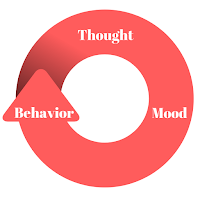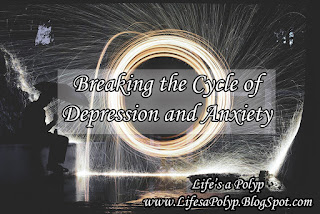It's difficult to not experience anxiety or depression at some point in life, particularly when dealing with a rare disease or other chronic illness. Such feelings at times are normal to experience but when they become long term feelings is when they can become more inhibitive or detrimental.
 It's helpful to understand the cyclical relationship between thoughts, mood, and behavior and how they interact with one another. It doesn't matter where you start in the cycle, each segment will affect the rest.
It's helpful to understand the cyclical relationship between thoughts, mood, and behavior and how they interact with one another. It doesn't matter where you start in the cycle, each segment will affect the rest.
For example, if I have the negative thought that my health will not improve leading to depressive feelings which may manifest in behaviors such as isolation and loss of interest in activities. These behaviors feed into new thoughts such as I'm never able to do anything which may make me feel more depressed and engage in increasing depressive behaviors.
Each part acts as fuel, reinforcing the cycle to continue. And so this is the same for other moods such as anxiousness or happiness.
The easiest way to change the cycle is to stop a negative thought in its tracks and replace it with a more positive thought. However, negative thoughts occur so automatically that we often fail to realize that we had a negative thought. It helps to know what kind of negative thoughts to look out for in order to start recognizing the occurrence of a negative thought.
- All or nothing thinking. Looking at situations as black and white with no middle ground. Either I can do everything or I can't do anything.
- Overgeneralization. Applying one experience to all future expectations. I can't do anything now or ever.
- Filtering out or diminishing the positive. Only recognizing the negative, ignoring the positive or excusing why the positive didn't count. I was able to do something this time but that's not how it usually is.
- Jumping to conclusions. Drawing negative conclusions or expectations without any evidence to be the case. I won't be able to do anything anyway, so why try.
- Emotional reasoning. Belief that what you emotionally feel is the reality of a situation. I feel like I can't do anything so therefore I can't nor will be.
- Expecting perfection. Holding yourself to a strict level of standards with no room for error or difficulty living up to unrealistic expectations. I can't do it the way I want so I can't do it.
- Personalizing everything. Taking others words or actions personally even if they were not directed at you. They didn't invite me to their activity because they don't care about me.
Familiarizing ourselves with the types of negative thoughts can help us to recognize when we have a negative or discouraging thought. If you have a bothersome feelings, ask yourself the following questions:
- What happened that is bothering me?
- What were my first thoughts about it?
- How did I feel when it happened?
- What did I do?
- What happened as a result?
- Am I satisfied with that outcome?
These questions will help us to understand our thoughts and feelings associated with an experience or situation. Once we understand what is going on behind the scenes in our mind, we can tackle the problem and work toward a more positive experience. This is particularly helpful by changing or reframing the identified negative thought when such an occurrence occurs.
Instead of thinking "I can't do anything because I'm sick", we can reframe this discouraging thought to "I'm not able to do as much as I would like to right now, but tomorrow I may be able to do more than I am today".
Negative thoughts are not easy to change over night. We engage in negative, discouraging thoughts so abundantly as human beings that it has become an automatic habit. But like with any habit, habits can be changed. It just takes continued effort and determination to create a new habit. So don't give up, it may take some time but it will be helpful for mental well-being to continue such efforts.
Changing behaviors can also help to enhance positive thoughts and emotions. Often when we are anxious or depressed we will isolate, decrease activity levels, over sleep or not sleep, and increase or decrease food intake. There are a number of behaviors that we can engage in to help calm the mind and those bothersome feelings.
- Here's a step by step guide to such helpful behavior exercises.



No comments:
Post a Comment